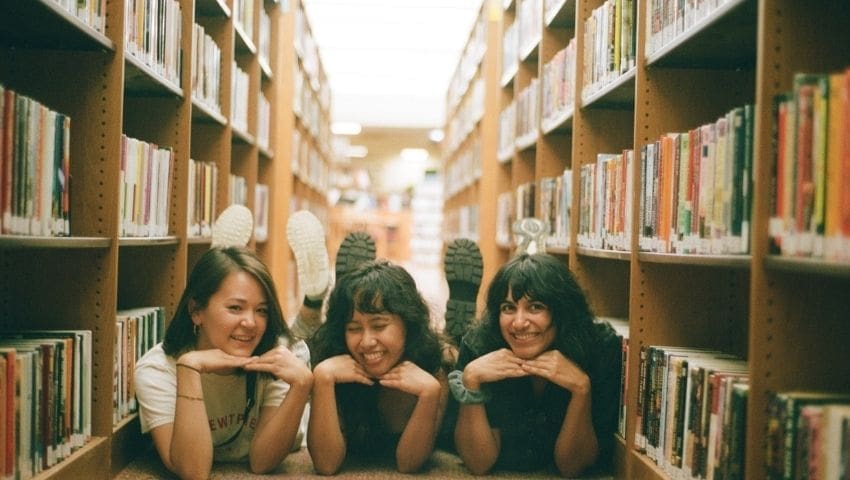
Sen. Cory Booker on his marathon, 25-hour speech on the Senate floor
April 2, 2025
Parents sue Bucknell alleging hazing led to freshman football player’s death
April 2, 2025Female filmmakers at SXSW are telling bold, urgent stories—but without Hollywood’s deep pockets, they’re still fighting to get their work seen.
This story was originally published by Austin Free Press, a nonprofit news and community engagement platform to empower Austinites through independent reporting, diverse opinions and civil dialogue.
With South by Southwest (SXSW) Film Festival in Austin’s rearview mirror, some of its most talented female filmmakers still have a long road ahead to bring their movies to public screens. Even the women who clinched premieres at one of America’s most prestigious festivals have to hustle to support their craft, they told Austin Free Press.
“The streaming channels that dominate global viewership are no longer buying many smaller or risk-taking projects,” Keri Putnam wrote in a recent study by Harvard Kennedy School’s Shorenstein Center that examined underfunding of independent films. “Instead, they offer mostly sequels, action, fantasy, true crime, genre, influencers and celebrity content.”
The average budget for a Hollywood movie is about $100 million, according to Investopedia. By contrast, the typical budget for an indie narrative is $2.5 million and just $50,000 to $500,000 for documentaries. Despite these disparate budgets, more women than ever are producing some of the year’s most provoking and heartfelt films in the independent space—many of which will hit home for Texans.
Uvalde Mom

On May 24, 2022, 19 children and two teachers were celebrating their last day at Robb Elementary School in Uvalde before summer break when they were brutally murdered by an 18-year-old gunman.
Mother Angeli Rose Gomez made worldwide headlines by jumping a fence and racing in unarmed to save her two young sons. But the documentary Uvalde Mom isn’t just about 376 uniformed officers failing to intervene for an excruciating 77 minutes on that tragic day. Director Ananyansi Prado’s story also is about years of alleged systemic police inaction, corruption and vengeance.

SXSW festival goers audibly cried, gasped, shouted and booed as they watched Gomez surveilled and ultimately jailed following the mass shooting. In the film, Gomez says she was targeted and harassed by police due to her public criticism of the Uvalde response.
Prado has devoted her career to telling the stories of marginalized yet resilient Latino women and children. But working outside of mainstream Hollywood studios comes at a price. “The number one challenge is fundraising,” Prado told Austin Free Press. “At one point we didn’t have any funding for eight months, and we had to let go of our entire [Uvalde Mom] team,” she said.
Prado said she donned a producer’s hat to raise money, securing just enough to pay her editor before SXSW’s final deadline. Though Prado is grateful to such supporters as Women Make Movies and Chicken & Egg Films for helping her across the finish line, she said the scramble “was really rough.”
The Librarians
Kim Snyder’s The Librarians follows women in a long undervalued and underpaid profession who now have come under attack.

On one side of the nation’s book-ban frenzy, the film shows crusaders fighting to pull from shelves books that they claim constitute “pornography” and “DEI.” On the other side, the librarians agree that parents should monitor their children’s books—but firmly reject the wholesale removal of books about Black and LGBTQ people from libraries.
The Librarians depicts women very differently from male-dominated mainstream movies. The University of Southern California’s “The Future is Female” report reveals that nearly half of the women in studio pictures are depicted as sex objects. Women in these films also speak less than they are spoken to. And too often when female characters in mainstream movies break their silence, it’s to speak about men.

Female-driven indie films hit different.
Snyder and some of her crew discussed their work during SXSW. “I’m humbled,” director Kim Snyder told Austin Free Press. “I feel like I’ve told a story about everyday American patriots.”
“It’s about protecting the First Amendment,” added Carolyn Foote, a recently retired Austin Independent School District librarian featured in the film.
“We try to make materials available for every possible child or teen who walks in the door, so they feel respected and like they belong,” said Becky Calzada. Calzada and Foote both are co-founders of Texas FReadom Fighters, a librarian group promoting intellectual freedom.
“It was shocking how aggressive some of the pro-book-banning people were at these school board meetings,” said one of the film’s cinematographers, Austin-based filmmaker Amy Bench. “But I wasn’t fearful.”
“One thing the film really shows is that people aren’t wanting to have a dialogue. They’re saying, ‘I want to kill you.’ ” Foote explained. “It made me think a lot about the Salem witch hunts, because a lot of us are women. Easy targets.”
In recent surveys, 77 million people said that they would be willing to pay for a channel dedicated to independent documentaries featuring real-life heroes akin to those championed in The Librarians.
Yet such top streamers as Netflix, Amazon Prime and Disney+ underinvest in independent titles, according to a study by the Shorenstein Center on Media, Politics and Public Policy. This reduces indie viewership and makes it harder for underrepresented artists to reap profits. That’s why filmmakers say they must perpetually fundraise.
“It’s not like we have a Netflix budget,” Snyder said. “Our work requires dedication and sacrifice.”
Bookmarks

Austin filmmaker Kayla Galang’s An Ongoing List of Things Found in the Library Book Drop, Usually Being Used as Bookmarks is based on a poem written by a former librarian who found all matters of discarded treasures in a book drop. The movie is pure fantasy and whimsy. In discovering Polaroids of a stranger’s wedding, Galang’s librarian (Daniel Sanchez Chicaguala) is magically transported to a lavish ceremony between the stacks.

The SXSW audience laughed and cheered as the librarian happily discovered passports, orange peels, rusty nails, and used teabags stuck between the pages of returned books. A crowd favorite, Bookmarks might well be the kind of independently produced fiction film that viewers crave yet rarely find.
The film industry’s overwhelming lack of support for women of color such as Galang is well documented in UCLA’s biannual Hollywood Diversity Report, which reveals that less than 3 percent of mainstream movies employed female directors.
“Being an Asian female, people’s perception of me is that I’m quiet, unassertive, and afraid to take up space,” said Galang. “On male-dominated sets there are assumptions you don’t belong.”
During past shoots, Galang said that she even felt physically unsafe.
That is why Galang says she is intentional about creating safe spaces for women and people of color on her sets. Hiring more Filipino Americans behind the scenes has led to her films showcasing more “cultural specificity,” she said.
But Galang’s main battle is the same as all the women who spoke with Austin Free Press at SXSW. “I’m in debt,” said the director. Mainly funding her films through crowdfunding, Galang says she sometimes taps personal funds to cover the rest.
Even so, Galang says she would rather fight for indie support than chase Hollywood.
“The beauty and pain of independent filmmaking is that you’re not answering a mandate,” she says. That affords Galang the freedom to tell more nuanced stories about underrepresented people—and to hire more marginalized artists behind the camera.
Prado, Snyder and Galang all exemplify what statistics prove: Women hire more women. All three female directors hired female executive producers (who represent 21 percent of the industry), editors (21 percent) and cinematographers (5 percent).
Empower Women
On one unapologetically female-forward SXSW panel, veteran TV producer and Austin Film Society’s director of community education, Rakeda Ervin, said, “It’s always been a woman that’s given me an opportunity.”
Ervin later told the Austin Free Press that she’s hopeful about the future of independent cinema. “Everybody’s story matters and people love diversity in storytelling,” she said.
Ervin recommended a host of locally-based resources for Austin artists struggling in today’s independent market. “Look into AFS grants and Creative Careers programs, ITVS,” she said, “or find an indie filmmaker that you admire and ask questions.”
All the women that the Austin Free Press interviewed encourage marginalized independent artists to be passionate, foster mentorships, and to keep investing in their stories. Studies prove audiences want more.
Great Job Alex Chew, Austin Free Press & the Team @ Ms. Magazine Source link for sharing this story.






